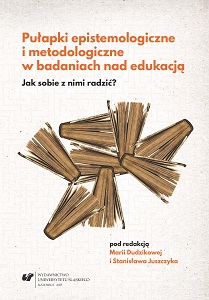Jak badać to, o czym nie wiemy? Kilka uwag o roli wstępnej wiedzy w badaniach empirycznych
How to study the thing with which we are not familiar? Some remarks about the role of preliminary knowledge in empirical research
Author(s): Danuta Urbaniak-Zając
Subject(s): Higher Education , Educational Psychology
Published by: Wydawnictwo Uniwersytetu Śląskiego
Keywords: empirical research; qualitative research; the role of preliminary knowledge; hypotheses; premises
Summary/Abstract: The purpose of the article is to convince young researchers that the legitimacy of the methodological rules and recommendations may be evaluated only in the context of the purpose of the research which is conducted and the premises which constitute such research. An exemplification of this general problem is the role of hypotheses in empirical research, both in qualitative and qualitative research. At the starting point the author distinguishes the hypotheses from the premises, for they perform different roles in the research process. These premises are accepted and they constitute the nature of the object under study and the manner in which it is studied, whereas the hypotheses are subject to empirical scrutiny. The author indicates the ambiguities of the hypotheses: on the one hand, by channelling cognition, these hypotheses limit cognition (the female and male researchers focus only on the thing that is stipulated by the hypotheses), they impose an idea about reality upon reality itself. The idea is subject to scrutiny. On the other hand, the hypotheses are an expression of the realization f the preliminary knowledge of the female and male researchers, which is particularly important in qualitative research because uncontrolled knowledge affects uncontrollably the process of the interpretation of empirical research. The function of hypotheses which is rarely discerned is to indicate the problem which is supposed to be solved. If the given instance of cognition changes the initial hypotheses, it means that a thing which heretofore was unfamiliar was revealed.
Book: Pułapki epistemologiczne i metodologiczne w badaniach nad edukacją. Jak sobie z nimi radzić?
- Page Range: 80-96
- Page Count: 17
- Publication Year: 2017
- Language: Polish
- Content File-PDF

